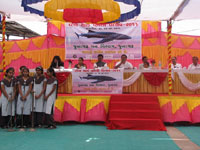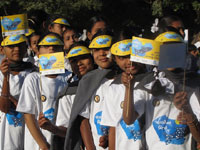Mangrol, Gujarat, adopts whale shark as its mascot as a part of the Whale Shark Campaign supported by TCL
2011
Mangrol, Gujarat, adopts whale shark as its mascot as a part of the Whale Shark Campaign supported by TCL
Mangrol (Gujarat): Mangrol, a small fishing town situated along the Gujarat coast, has a new mascot — the whale shark. The adoption was declared during the Whale Shark Day celebrations this morning, marking the culmination of six years of the highly successful Whale Shark Campaign.
 An initiative of the Gujarat Forest Department and Wildlife Trust of India - International Fund for Animal Welfare (WTI-IFAW) supported by Tata Chemicals (TCL), the campaign was launched in January 2004 to spread awareness on the plight of whale sharks.
An initiative of the Gujarat Forest Department and Wildlife Trust of India - International Fund for Animal Welfare (WTI-IFAW) supported by Tata Chemicals (TCL), the campaign was launched in January 2004 to spread awareness on the plight of whale sharks.
The species was previously hunted in hundreds in Gujarat for their liver oil used to waterproof boats; the by-products including meat and fins were exported.
Since the launch of the campaign, more than 200 whale sharks accidentally caught in fishing nets, have been freed by the Gujarati fisher folk. With the crucial support of the fishing community, the Coast Guard, the local people as well as their leaders including the popular leader Morari Bapu, and even children, the whale shark is now safe on the shores of Gujarat.
 The Whale Shark Day celebrations kicked off with a rally by hundreds of children, following the 40-foot-long whale shark inflatable from Parmeshwar Vidyalaya to the event venue at the town jetty, Mangrol. The event was chaired by the additional principal chief conservator of forests for Gujarat, CN Pandey and also attended by the chief conservator of forests, SK Chaturvedi along with representatives from WTI and TCL.
The Whale Shark Day celebrations kicked off with a rally by hundreds of children, following the 40-foot-long whale shark inflatable from Parmeshwar Vidyalaya to the event venue at the town jetty, Mangrol. The event was chaired by the additional principal chief conservator of forests for Gujarat, CN Pandey and also attended by the chief conservator of forests, SK Chaturvedi along with representatives from WTI and TCL.
Speaking at the event, Mr Pandey said, “The city of Mangrol has been closely associated with whale shark conservation for the last four years, the fisher folk contributing selflessly to many rescues. It is a matter of great pride that they are now taking their dedication to the next level by officially adopting the Vhali.”
Mangrol is the seventh town in Gujarat to have adopted the whale shark as a city mascot. Previously Porbandar, Diu, Okha, Ahmedabad, Veraval and Dwarka had adopted the whale shark as their official mascot.
Through the years, the campaign has achieved several other significant milestones. On March 12, 2005, the postal department of Gujarat came out with a special whale shark postal cover. On November 10, 2005, TCL was awarded the BNHS Green Governance Award for the whale shark campaign by the Prime Minister, Manmohan Singh.
 Speaking at the occasion Rajbir Singh Saini, head, ER and administration, TCL, said, “Over the years, the whale shark conservation project has grown in leaps and bounds with each passing day. Today, over 225 whale sharks have been rescued till date, and we are proud to achieve this milestone. TCL is committed to save the flora and fauna and will take steps forward in conserving nature and its rare species in years to come.”
Speaking at the occasion Rajbir Singh Saini, head, ER and administration, TCL, said, “Over the years, the whale shark conservation project has grown in leaps and bounds with each passing day. Today, over 225 whale sharks have been rescued till date, and we are proud to achieve this milestone. TCL is committed to save the flora and fauna and will take steps forward in conserving nature and its rare species in years to come.”
The overwhelming success of the campaign was a result of multiple strategic approaches involving connection to human emotions and socio-cultural beliefs. Morari Bapu established a comparison of the whale shark to a daughter returning home to give birth, based on reports of sightings of whale shark pups in Gujarat.
This message was spread across the coastal towns through street plays and awareness campaigns and proved to be instrumental in the success of this project which depends heavily on people’s involvement.
While the campaign helped create a flagship of the whale shark, very little scientific information was available on the species in India.
“The turnaround in the fate of the fish is inspiring. There is no other species in India that has a ‘day’ dedicated to it, and no other species, let alone a fish, has been adopted by so many cities as their mascot,” said Rahul Kaul, senior director, WTI. “The campaign covered one aspect of whale shark conservation in India. The other aspect that we have now initiated looks at generating scientific information on the species for its conservation.”
The Forest Department, WTI-IFAW and TCL are currently undertaking scientific studies on whale sharks through photo-identification, genetic analysis and tagging, as well as research on its habitat.